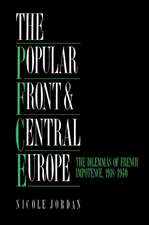Idealism beyond Borders: The French Revolutionary Left and the Rise of Humanitarianism, 1954–1988: Human Rights in History
Autor Eleanor Daveyen Limba Engleză Paperback – 4 apr 2018
| Toate formatele și edițiile | Preț | Express |
|---|---|---|
| Paperback (1) | 283.63 lei 6-8 săpt. | |
| Cambridge University Press – 4 apr 2018 | 283.63 lei 6-8 săpt. | |
| Hardback (1) | 686.40 lei 6-8 săpt. | |
| Cambridge University Press – 16 dec 2015 | 686.40 lei 6-8 săpt. |
Din seria Human Rights in History
-
 Preț: 276.61 lei
Preț: 276.61 lei - 8%
 Preț: 564.42 lei
Preț: 564.42 lei -
 Preț: 184.88 lei
Preț: 184.88 lei -
 Preț: 228.50 lei
Preț: 228.50 lei -
 Preț: 201.76 lei
Preț: 201.76 lei -
 Preț: 230.61 lei
Preț: 230.61 lei -
 Preț: 305.34 lei
Preț: 305.34 lei -
 Preț: 281.54 lei
Preț: 281.54 lei -
 Preț: 307.25 lei
Preț: 307.25 lei -
 Preț: 250.77 lei
Preț: 250.77 lei -
 Preț: 276.61 lei
Preț: 276.61 lei -
 Preț: 242.08 lei
Preț: 242.08 lei -
 Preț: 232.73 lei
Preț: 232.73 lei -
 Preț: 228.29 lei
Preț: 228.29 lei -
 Preț: 277.57 lei
Preț: 277.57 lei - 9%
 Preț: 593.66 lei
Preț: 593.66 lei -
 Preț: 190.81 lei
Preț: 190.81 lei -
 Preț: 226.59 lei
Preț: 226.59 lei -
 Preț: 223.47 lei
Preț: 223.47 lei - 14%
 Preț: 880.41 lei
Preț: 880.41 lei - 11%
 Preț: 587.08 lei
Preț: 587.08 lei -
 Preț: 212.74 lei
Preț: 212.74 lei -
 Preț: 276.07 lei
Preț: 276.07 lei -
 Preț: 315.41 lei
Preț: 315.41 lei - 14%
 Preț: 745.07 lei
Preț: 745.07 lei - 11%
 Preț: 590.75 lei
Preț: 590.75 lei -
 Preț: 260.26 lei
Preț: 260.26 lei -
 Preț: 229.25 lei
Preț: 229.25 lei -
 Preț: 322.04 lei
Preț: 322.04 lei -
 Preț: 268.13 lei
Preț: 268.13 lei - 11%
 Preț: 528.55 lei
Preț: 528.55 lei -
 Preț: 283.46 lei
Preț: 283.46 lei - 14%
 Preț: 696.45 lei
Preț: 696.45 lei - 11%
 Preț: 573.74 lei
Preț: 573.74 lei -
 Preț: 222.14 lei
Preț: 222.14 lei
Preț: 283.63 lei
Nou
Puncte Express: 425
Preț estimativ în valută:
54.28€ • 56.55$ • 45.13£
54.28€ • 56.55$ • 45.13£
Carte tipărită la comandă
Livrare economică 08-22 februarie 25
Preluare comenzi: 021 569.72.76
Specificații
ISBN-13: 9781107644045
ISBN-10: 1107644046
Pagini: 347
Dimensiuni: 153 x 210 x 23 mm
Greutate: 0.47 kg
Editura: Cambridge University Press
Colecția Cambridge University Press
Seria Human Rights in History
Locul publicării:New York, United States
ISBN-10: 1107644046
Pagini: 347
Dimensiuni: 153 x 210 x 23 mm
Greutate: 0.47 kg
Editura: Cambridge University Press
Colecția Cambridge University Press
Seria Human Rights in History
Locul publicării:New York, United States
Cuprins
Introduction; Part I. Idealism beyond Borders: 1. A revolution in aid: the creation of sans-frontiérisme; 2. Aiding the revolution: influences on tiers-mondisme; Part II. Violence and Morality: 3. The struggle for international justice: tiers-mondiste engagement on the outskirts of May; 4. Complicity, conscience and autocritique: reconfiguring attitudes to political violence; 5. A rhetoric of responsibility: Vichy, the Holocaust, and suffering in the third world; Part III. Ethics and Polemics: 6. Idealism beyond borders: the turn to sans-frontiériste spectacle; 7. Controversy in a humanitarian age: attacks on tiers-mondisme in the 1980s; Conclusion; Notes; Index.
Recenzii
'Humanitarian agencies, including Médecins Sans Frontières, often struggle to understand current political processes and live in a 'perpetual present'. This creates major difficulties in recontextualising political processes that could help humanitarian workers and organizations have a better understanding of modern dilemmas and constraints during their daily activities. By describing two activist moments in France, tiers-mondiste and sans-frontièriste, and the process by which one came to displace the other as the dominant way of approaching suffering in the Third World, Eleanor Davey helps us to see how the past is connected to the present, identifying a failure that she rightly underlines as shaping many analyses of humanitarianism. This book is a very interesting account of the intellectual roots of current humanitarianism, and helps us create links between recent 'humanitarian thinking and longer political and intellectual processes of change'.' Caroline Abu Sa'Da, Médecins Sans Frontières, Switzerland
'A masterly and imaginative tracking of French intellectuals' relationship with global events, from revolutionary Third Worldism to humanitarian intervention. This subtle portrayal of complex debates shaped by the Cold War and decolonisation is conceptually sophisticated, subtle in its analysis, and beautifully written. It is a formidable contribution to the history of the second half of the twentieth century.' Robert Gildea, University of Oxford
'As a historian who has worked in the humanitarian sector, Eleanor Davey brings the wisdom of reflected experience to bear on [her] deeply researched study of French engagement for the 'Third World'. She eschews the lazy generalizations that characterize the field by highlighting how the complex analogizing of World War Two memory with contemporary events informed the tension between the politics of emergency relief and social transformation. So long as these conflicting priorities continue, Idealism beyond Borders will remain an essential touchstone for understanding the humanitarian challenges of our time.' Dirk Moses, European University Institute
'The 'Doctors without Borders' surged into view in the 1970s, and the muscular way they stepped into dangerous situations to tend to those in need continues to stir hearts and minds. Eleanor Davey has written a rich and incisive history of this new form of activism, which brought contemporary humanitarianism into being. It offers crucial new lenses - of French design and with a very wide angle - to see how the 1970s made the post-9/11 world.' Todd Shepard, The Johns Hopkins University
'An extremely illuminating book. It busts any simple myth about the founding of Médecins Sans Frontières to tell the full story of the organization's tangled roots in radical French politics. Davey is a very talented historian of ideas and gives an engaging account of the ideological development of one of the world's great humanitarian organizations.' Hugo Slim, University of Geneva
'A timely contribution to more thoughtful conversations about the imperatives of humanitarian action. … a well-researched investigation of the evolution of French left-wing tiers-mondiste and humanitarian sans-frontie ´riste thought in the second half of the twentieth century convincingly shows how ideas about the revolutionary promise of the Third World were transformed by the observance of Marxist regimes' atrocities into a neutral or anti-communist ideology of humanitarianism. … an excellent example of rigorous intellectual history that both uncovers the peculiarities of French international idealism between 1954 and 1988 and offers readers much to contemplate as regards humanitarian action in the present.' Emily C. H. Riley, Journal of Contemporary History
'Dense, well-sourced, and [an] erudite piece of historiography … succeeds in offering a fresh perspective to the extant literature.' Luca Falciola, International Labor and Working-Class History
'A major contribution to the field. Idealism beyond Borders furnishes nuanced but useful meaning not merely for its immediate arenas of tiers-mondisme and sans-frontierisme, but for a wider ranging shift in left-wing international thought and activism in the second half of the twentieth century.' Roland Burke, Human Rights Quarterly
'Eleanor Davey's book makes enjoyable reading, with its caustic and forceful view of the pedigree of 'sans-frontiérisme', mapping an intellectual landscape which spreads beyond the borders of France and which is still to a large extent ours to this day.' Frédéric Thomas, Humanitarian Alternatives
'A masterly and imaginative tracking of French intellectuals' relationship with global events, from revolutionary Third Worldism to humanitarian intervention. This subtle portrayal of complex debates shaped by the Cold War and decolonisation is conceptually sophisticated, subtle in its analysis, and beautifully written. It is a formidable contribution to the history of the second half of the twentieth century.' Robert Gildea, University of Oxford
'As a historian who has worked in the humanitarian sector, Eleanor Davey brings the wisdom of reflected experience to bear on [her] deeply researched study of French engagement for the 'Third World'. She eschews the lazy generalizations that characterize the field by highlighting how the complex analogizing of World War Two memory with contemporary events informed the tension between the politics of emergency relief and social transformation. So long as these conflicting priorities continue, Idealism beyond Borders will remain an essential touchstone for understanding the humanitarian challenges of our time.' Dirk Moses, European University Institute
'The 'Doctors without Borders' surged into view in the 1970s, and the muscular way they stepped into dangerous situations to tend to those in need continues to stir hearts and minds. Eleanor Davey has written a rich and incisive history of this new form of activism, which brought contemporary humanitarianism into being. It offers crucial new lenses - of French design and with a very wide angle - to see how the 1970s made the post-9/11 world.' Todd Shepard, The Johns Hopkins University
'An extremely illuminating book. It busts any simple myth about the founding of Médecins Sans Frontières to tell the full story of the organization's tangled roots in radical French politics. Davey is a very talented historian of ideas and gives an engaging account of the ideological development of one of the world's great humanitarian organizations.' Hugo Slim, University of Geneva
'A timely contribution to more thoughtful conversations about the imperatives of humanitarian action. … a well-researched investigation of the evolution of French left-wing tiers-mondiste and humanitarian sans-frontie ´riste thought in the second half of the twentieth century convincingly shows how ideas about the revolutionary promise of the Third World were transformed by the observance of Marxist regimes' atrocities into a neutral or anti-communist ideology of humanitarianism. … an excellent example of rigorous intellectual history that both uncovers the peculiarities of French international idealism between 1954 and 1988 and offers readers much to contemplate as regards humanitarian action in the present.' Emily C. H. Riley, Journal of Contemporary History
'Dense, well-sourced, and [an] erudite piece of historiography … succeeds in offering a fresh perspective to the extant literature.' Luca Falciola, International Labor and Working-Class History
'A major contribution to the field. Idealism beyond Borders furnishes nuanced but useful meaning not merely for its immediate arenas of tiers-mondisme and sans-frontierisme, but for a wider ranging shift in left-wing international thought and activism in the second half of the twentieth century.' Roland Burke, Human Rights Quarterly
'Eleanor Davey's book makes enjoyable reading, with its caustic and forceful view of the pedigree of 'sans-frontiérisme', mapping an intellectual landscape which spreads beyond the borders of France and which is still to a large extent ours to this day.' Frédéric Thomas, Humanitarian Alternatives
Notă biografică
Descriere
A major new study of the political and intellectual origins of modern humanitarianism from the 1950s to the 1980s.











